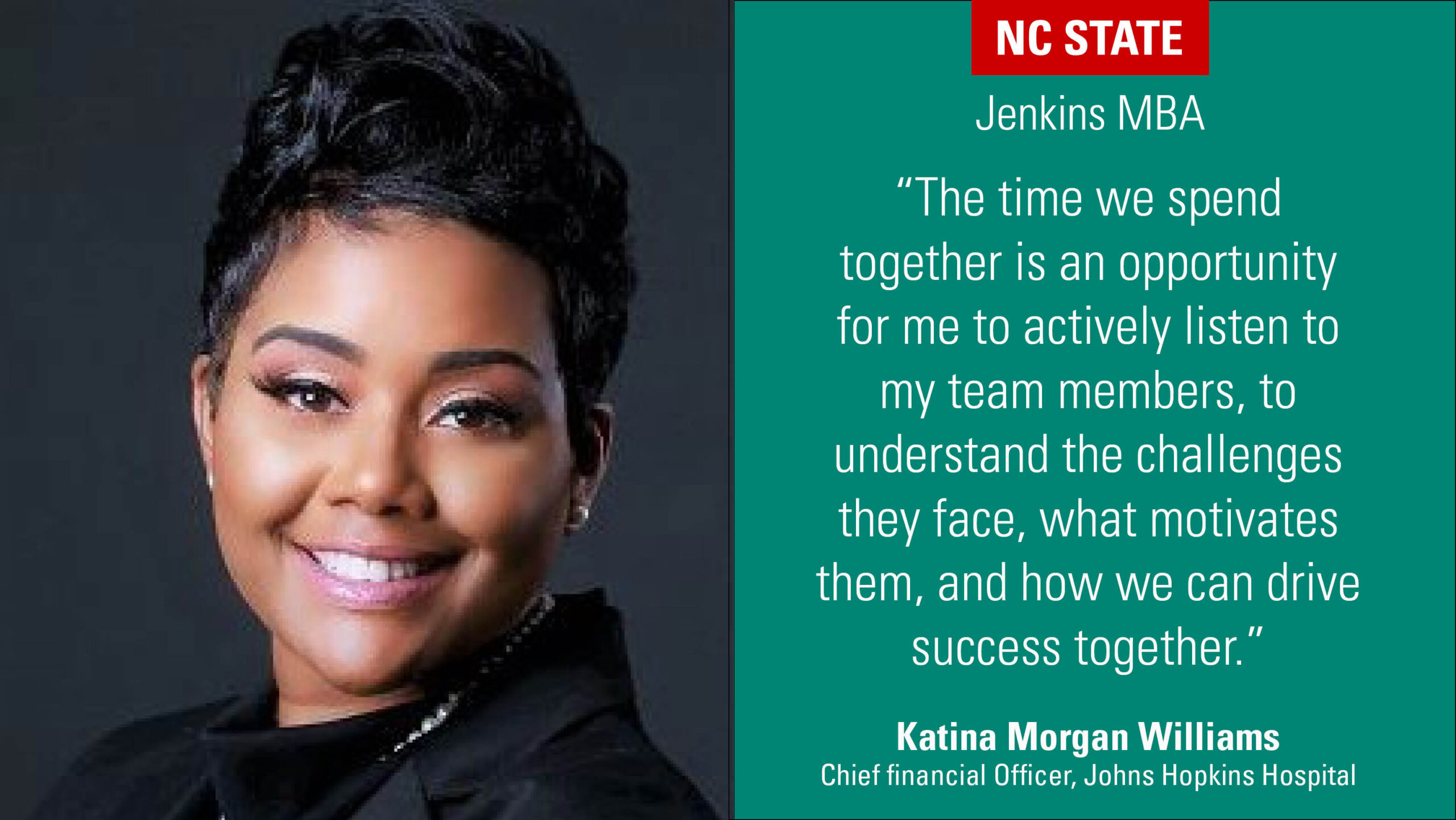MBA Alumna Takes Her Skills to John Hopkins Hospital as CFO
Katina Morgan Williams looks to focus beyond the numbers in her new role chief financial officer for The Johns Hopkins Hospital. Instead prioritizing relationships and advancing the hospitals's objectives.

One of the most valuable takeaways for Katina Morgan Williams from Jenkins’ MBA program was that, even in the world of finance, it’s sometimes important to look beyond numbers and focus on people for maximum success.
In her new role as vice president of finance and chief financial officer for The Johns Hopkins Hospital, she makes a point to check in regularly with her talented team of directors, managers, and analysts to create relationships and advance the hospitals’s objectives.
In less than two weeks on the job, Katina connected one-on-one with everyone on her team.
“The time we spend together is an opportunity for me to actively listen to my team members, to understand the challenges they face, what motivates them, and how we can drive success together,” the 2019 Jenkins graduate says.
At Johns Hopkins, Katina oversees total annual operating revenues of approximately $3 billion “to ensure the financial sustainability of the flagship hospital,” she says. That means managing expenses, maximizing reimbursement, and making sound investments in facilities and technology to support the Johns Hopkins Medicine tripartite mission in medical education, research and clinical care.
No pressure, right?
The leadership skills Katina strengthened in the MBA program and her strong connections with former Jenkins classmates help ease any pressure — and boost her confidence — as she starts her job in Baltimore.
“At Jenkins, I learned a lot about networking with people. And a lot of the leadership training you receive teaches you how to adapt as a leader, how to build high-performing teams, how to have a level of discernment in assessing skills, and how to be a role model, so your teams will want to follow you,” she says, “because you are role modeling those same behaviors. Gaining those leadership competencies really helped to catapult my career the most.”
The MBA also advanced Katina’s career with the Duke University Health System, where she was promoted from senior director of finance to assistant vice president for finance and divisional CFO of Duke University Health System. She transitioned from that position to Johns Hopkins. “The fact that I was pursuing the MBA absolutely was a factor” in the move up at Duke, she says.
Katina chose the Jenkins MBA program because of the applied-learning opportunities it provides for students.
“I didn’t want just the textbook kind of MBA. I wanted to really get my hands dirty and do real-life simulations. That’s what the program provided for me.”
In one of her courses, students worked as consultants to address a challenge for an existing business. “You learn really about building relationships, how to connect, how to commit to something, engage and follow through,” Katina says.
Classes on delivering effective presentations helped her hone her skills, too.
One of the most valuable aspects of the Jenkins program for Katina was the bonds she developed.
“I was able to network with folks across different industries and make friends with people I’m still in touch with today, establishing and keeping what I consider really to be lifelong connections.”
At Duke, Katina hired a Jenkins classmate as a senior financial analyst who has since been promoted there. Now, at Johns Hopkins, she shares ideas — and challenges — with fellow MBA graduates and encourages them to refer qualified professionals to her for potential job openings in her department.
Katina’s most important resource at Jenkins was her academic advisor, Vilma Mueller. Vilma continues to provide support that will help Katina succeed in her position at Johns Hopkins.
“She guided me through course selection, helped me establish a manageable pace, and was, without a doubt, one of my biggest advocates,” Katina says. “Now, she reminds me of the importance of self-care and balance, which are vital components of being an effective leader.”


